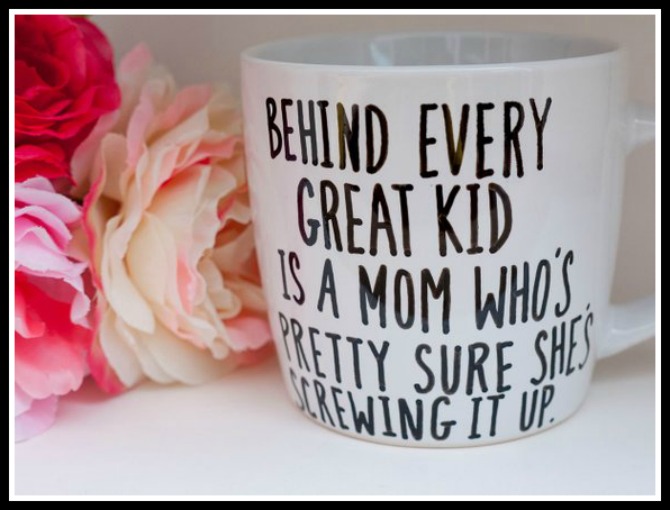Every motherhood journey is different. Some women arrive at motherhood accidentally, others after years of infertility. Women become mothers through birth, adoption, and marriage, via C-section and legal paperwork and natural birth. There are almost always tears, though the ratio of happy to heartbroken varies. And our experiences within our mothering roles are just as unique as our paths to getting here. But one thing we all have in common: Mom Guilt.

I haven’t met a mother who hasn’t experienced guilt at some level. It begins in pregnancy when an obstetrician’s frown implies some glaring shortcoming in our prenatal self-care, and I’m told that the guilt lingers with empty nesters long after the chicks have flown the coup. Mothers are revered for our strength and commended for our selfless acts, yet we are also scrutinized and criticized at every turn. We are regularly brought before the People’s (Culture’s) Court and found guilty—of caring too much, or too little; being negligent or overprotective; using the wrong sunscreen, feeding the wrong foods, failing to use the proper (Read: politically correct) lingo when disciplining our children, posting one too many pictures (or one too few) online.
Society is brutal in its treatment of mothers, and we moms can be ruthless with our criticisms of one another. But no external voices are quite as vicious as the ones inside our own heads, badgering us with incessant name calling and chastising every misstep. We question every action, every word, and we find ourselves failing to measure up. We mothers are fierce in our parenting, and in our self-condemnation.
The most frequently discussed aspect of mom guilt relates to the debate between moms who work and those who stay home. My mom friends who work day-jobs worry that they’re missing out on their kids’ childhoods, that their children will grow up questioning their mothers’ love or loyalty. But as a full-time stay-at-home mom, I can attest to plenty of guilt on this side of the debate too. One major guilt hotspot relates to my not contributing to our family’s finances: we’ve made a number of sacrifices in order for me to stay home with Charleston, and I know that our quality of life (at least, that which can be measured externally) could increase significantly if I were to pour my energies into jumpstarting a career. (Of course there’s the side issue that I don’t exactly have a thriving pre-child career to return to, but that’s a whole different subject).

Because I do stay home and don’t have a job to worry about, I also experience guilt when I’m not committing 100% of my time to entertaining my child; I don’t have the excuse of a job or too little free time to explain why we aren’t going on grand mother/son adventures every day of the week, or why I drop him off at the gym childcare for an hour each day while I work out. On the flip side, I sometimes worry I’m sending the wrong message by designing a majority of our days around Charleston and his needs. In a recent podcast, Jenn Hatmaker made a snide comment about moms who “make their children the center of their universe.” Her words didn’t feel good, and they’ve been a spur in my conscious every since.
Did past generations of mothers struggle with guilt? My guess is yes, though not at the epidemic levels we do today. Women in the past had few options, and therefore did not have to worry that they’d taken the wrong path. They also weren’t spending vast quantities of time on social media, viewing every other mom’s highlight reel while ignoring their own mounting laundry piles or tantruming children and drowning feelings of inadequacy in a pint of ice cream. (Oh wait, is that just me? Okay, cool.)
Whether the plight of the Guilty Mom Conscious is a new one or dates back to the time of Eve, I believe the answer is simple. First, we need to listen to the guilt. Unlike shame, which tells us that we are inherently flawed and is almost always harmful, guilt can be constructive. Guilt shows us where we have gone wrong and creates space for us to make amends. Brené Brown tells us that guilt, though uncomfortable, is adaptive: it allows us to hold what we’ve done up against who we want to be. So when we are experiencing guilt, we need to take a moment to ask: is the story I’m telling myself (or society is telling me) true? Have I strayed from my path? Is there room for improvement? Is guilt serving a valuable purpose in my life right now?
But here’s the kicker: sometimes guilt is actually shame, masquerading as a life-enhancing force when really it is serving no purpose other than to tear us down. So how will we know the difference? By identifying our values and getting clear on the type of mom we want to be. Once we have clarified our values (NOT the values society is imposing on us, or the values of the mom next-door, but OUR values), the answer becomes clear. We are able to differentiate between guilt that is steering us into the right direction, and “guilt” that is simply tearing us down.

I’ve spent a lot of time (and therapy dollars) over the last year identifying my personal values and shedding the superimposed expectations that were getting in the way. I’m learning to step away from the internal “To Work or Not to Work” debate because I know that for our family, my being a full-time influence in our son’s life is more important than owning our house or taking fancy vacations. I understand that this is not the top value for every family (or simply not financially possible for every family) and that’s okay; they have their priorities, and we have ours, and I don’t need to live by anyone’s standards but my own. For the record, they also don’t need to live by mine.
Sometimes the values method of vanquishing guilt is less straightforward. For instance, I value quality time with Charleston. But I also value a clean house. Yes, my relationship is more important, but I also know I won’t be able to fully engage with him when there are chores waiting to be done—so I must attempt to set aside the guilt for a time in order to temporarily reshift my priorities. I might not feel good about scrubbing my kitchen floors while he plays Legos by himself, but that’s okay. Or another example: last weekend Charleston attended a fun train event with his Dad and grandparents while I enjoyed some personal time for myself at home; it wasn’t easy for me to pass up on the adventure, but ultimately I value being a good mom during the week—and that means I need to take breaks on the weekends when I can.
The issue of fuzzily-defined values without clearcut answers also arises: for example, I value health, but the question of which foods/activities/words are healthy has as many answers as Millenials on Keto retreat. We can research until our Google searches run dry, and still not arrive at any definitive answers. In our world of limitless and easily accessible information, it can be tough to discern fact from fiction when it comes to the nitty-gritty issues, even when our big-picture values are clear.
So maybe identifying our values isn’t an all-encompassing solution to the guilt we moms endure. But I believe it’s a strong and healthy step. And where its agency ends, grace begins. Grace for other moms who do things just a little different. Grace for ourselves when we know we aren’t doing our best. Grace for our kids and their futures, that are out of our hands.
